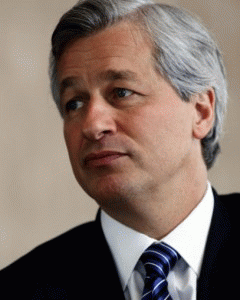More and more people are calling for Jamie Dimon, CEO of JPMorgan Chase, to resign from the Board of the New York Federal Reserve.
His latest scandal, combined with Dimon's hypocrisy and relentless self-promotion, make him an obvious target. But Dimon isn't alone. Bankers dominate the Fed at the regional and national levels, and most of the other outside seats are held by executives from large corporations. (Remember Herman Cain?)
Should Dimon resign? They all should.
The Board Member With No Name
The scary thing is that Dimon may not be the Fed's most inappropriate board member. That honor may belong to the individual I call the Board Member With No Name. (I don't to want inflame the situation by identifying her, and what she represents is more important than who she is.)
Shouldn't a resume that includes being the top bank lobbyist and working for the firm that laundered a third of a billion dollars for Mexican drug cartels disqualify someone from serving at the Fed?
Before she became the banking industry's chief lobbyist, the Board Member With No Name was an executive at scandal-plagued Wachovia Bank, an institution whose egregious mismanagement led to its collapse and a government rescue. Wachovia's many scandals and crimes included: deceptively packaging its toxic subprime mortgage backed securities; rigging municipal bond bids, which led to a $148 million fine; and, worst of all, laundering $378 billion in drug money for the Mexican cartels that have murdered at least 60,000 people.
The legislators who passed the Federal Reserve Act of 1913 couldn't have imagined that someday one of its governors would come from a firm that was busted when its laundered money was used to buy a drug-smuggling plane in Sinaloa.
Banks are large organizations, and it's unlikely that the Board Member even knew about the wrongdoing. She looks like a very nice person -- and she probably is. But her background hardly qualifies her for a position of public trust. After all, she's only two or three degrees of Kevin Bacon away from cartel bosses like "El Loco," who leads a group of deserters from the Mexican Army's Special Forces known as "Los Zetas."
Coincidentally, El Loco was arrested this week for beheading 49 people and dumping their bodies in the town square.
The drug cartels have been called "vicious," "evil," and "sociopathic." At Wachovia they were also called "preferred clients."
Conflicted
The New York Fed is the most powerful of all the regions -- understandably, since it includes Wall Street. Dimon's one of three bankers on its board. One of the others is from a bank which still owed the government nearly $1 billion in TARP money as of last report. The corporate world is represented by the CEOs of a technology venture capital firm, an HMO, and the company which owns Macy's and Bloomingdale's (who's actually said to be a good guy.)
The Richmond Fed's bank representatives include the leaders of First Citizens Bancshares and CommerceFirst bank, as well as the managing partner of a Charleston law firm who specializes in labor and employment law (judging from his resume he defends corporations). There are also executives from an oil company, a big construction company, and an aerospace manufacturer. The Seattle board includes executives from Wells Fargo Bank (Wachovia's new parent) and Boeing.
And so it goes ...
(Note: You can view every article as one long page if you sign up as an Advocate Member, or higher).






